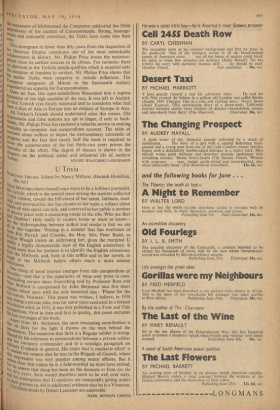U Trivia
li ss MiTrolta shows herself once more to be a brilliant journalist. er i article, which is the central piece among the reprints collected ii l 4biebis volume, reveals the full 'extent of her talent. Intimate, read- provocative, she has chosen as her topic a subject about or o'b all who speak can talk, ad conveyed to her public a number ano rivate jokes with a reassuring nudge in the ribs. Who are Bert hut baPhne? Only really U readers know or want to know- ,ibe understanding between author and reader is that we are hot LI this together. Writing in a manner that has overtones of b Eve Perrick and Crawfie, the Hon. Mrs. Peter Rodd, as i=ve linbilYri Waugh insists on addressing her, gives the marginal U s.vone a highly idiosyncratic view of the English aristocracy. It With d seem that her purpose is to identify the English aristocracy lang Iltbe Mitfords, and, both in this ardIcle and in her novels, to con at the Mitfords before others reach a more solemn elusion. 0 trivile thing of some interest emerges from this compendium of hinnl.litY—and that is the superiority of verse over prose in corn- \ us:eating certain ideas. Everything said by Professor Ross and :,littl M ((ford is compressed by John Betjeman into five short 11%.rc-as which start with the now immortal line : 'Phone for the iihu, bilives, Norman'. This poeni was written, I believe, in 1938 tireut ein8 a private joke, was for some years restricted to a limited L illion until, in 1951,. it was first published in a Time and Tide 141 veltiPetition. First in time and first in quality, this poem occupies asAt two pages of the book. thPart from Mr. Betjeman, the most interesting contribution is Neo.„0 Strix for the light it throws on the man behind the thenritYm. The suspicion that Strix is a Regular soldier is streng- d hi it by his reference to conversations between a private soldier initti :, s Company commander and to a nostalgic paragraph on (1, tn:11' t-i-speech in general. His claim that 'a moderate effort' is this ;k es Me suspect that he was in the.Brigade of Guards, where \eerr IsxPression was very popular among senior officers. But it lot. heelear that unless he is a field-marshal he must have retired, 104 fl/asserts that slang has been on the decrease at Eton for the ',ind hisY Years. Strix would therefore seem to be well over sixty, ,0 their assumption that U-speakers are continually giving orders Tn,,. grooms (p. 84) is additional evidence that he is a Victorian. "'illustrations by Osbert Lancaster are admirable.
MARK BONHAM CARTER


































 Previous page
Previous page